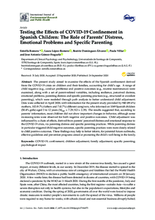Abstract
The present study aimed to examine the effects of the Spanish confinement derived from the COVID-19 crisis on children and their families, accounting for child’s age. A range of child negative (e.g., conduct problems) and positive outcomes (e.g., routine maintenance) were examined, along with a set of parent-related variables, including resilience, perceived distress, emotional problems, parenting distress and specific parenting practices (e.g., structured or avoidant parenting), which were modeled through path analysis to better understand child adjustment. Data were collected in April 2020, with information for the present study provided by 940 (89.6%) mothers, 102 (9.7%) fathers and 7 (0.7%) different caregivers, who informed on 1049 Spanish children (50.4% girls) aged 3 to 12 years (Mage = 7.29; SD = 2.39). The results suggested that, according to parents’ information, most children did not show important changes in behavior, although some increasing rates were observed for both negative and positive outcomes. Child adjustment was influenced by a chain of effects, derived from parents’ perceived distress and emotional response to the COVID-19 crisis, via parenting distress and specific parenting practices. While parenting distress in particular triggered child negative outcomes, specific parenting practices were more closely related to child positive outcomes. These findings may help to better inform, for potential future outbreaks, effective guidelines and prevention programs aimed at promoting the child’s well-being in the family.

